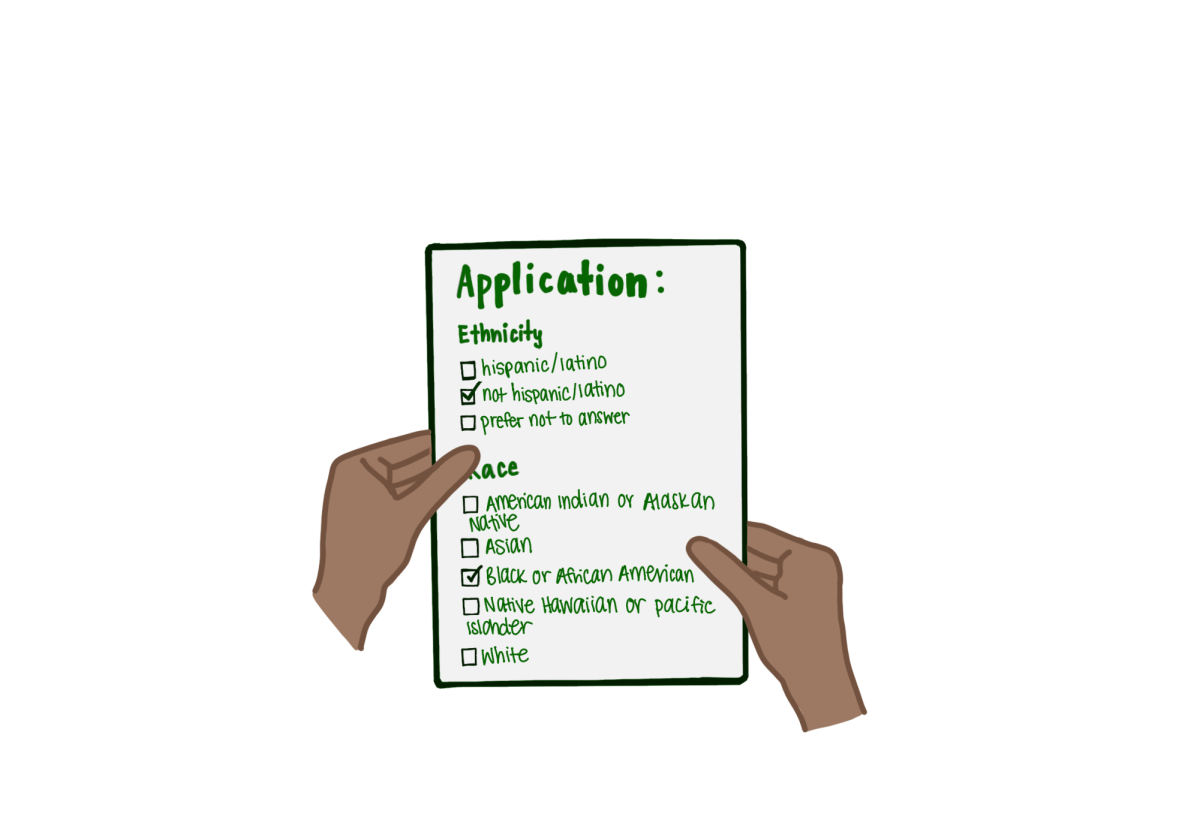Junior Miguel Jimenez said his household received an eviction notice in the first week of November.
Jimenez, who lives with his aunt, great-grandmother, and brother, immediately began looking for alternative housing for his younger brother.
“It came to the point where I was looking for places for my brother to stay, not even for myself,” Jimenez said. “I was asking some of my peers if he could stay [with them] and some of them said yes. Some of them said no [which is] not really their fault because we all have our own housing problems.”
Because his aunt, whom he lives with, doesn’t speak English, and the landlord doesn’t speak Spanish, Jimenez was responsible for communication about the lease between the two.
“My first reaction was sadness because I had to worry about so many things that I shouldn’t be worrying about,” Jimenez said. “It later shifted to anger because I couldn’t do anything. I couldn’t fix it.”
Overview
A statewide eviction moratorium that was put into effect on March 27, 2020 prevented landlords from evicting tenants who couldn’t pay the rent, providing needed relief to California residents struggling from COVID-19.
On Oct. 1, 2021, the California eviction moratorium ended. Santa Clara County was unable to extend it, leaving thousands of local families to face eviction notices.
After the eviction moratorium expired, Mountain View’s programs shifted their focus to eviction protection and defense, adding legal outreach, said Anky van Deursen, Mountain View Community Stabilization and Fair Rent Act Program Manager.
The city department’s main purpose is to inform individuals about rent relief, which “provides financial assistance for unpaid rent to eligible renters and landlords who have been impacted by COVID-19,” according to the state housing website.
Van Deursen said she wants people to know that rent relief is available until March 2022.
“Don’t give up, come to our weekly clinics [at the Mountain View Public Library],” Van Deursen said. “There is way more rent relief available than people think there is.”

Miguel
When the management of Jimenez’s complex in Mountain View changed, a resident brought up the fact that Jimenez and his brother were staying there.
The management then let them know that he, his brother, and his great-grandmother were not on the lease, Jimenez said.
“It surprised me a little bit but it also made me a little angry that they were making a big deal out of an 85-year-old woman staying there,” Jimenez said. “That has never been a problem.”
Jimenez said this was part of the reason the household received an eviction notice, in addition to an inability to pay rent.
Jimenez said he doesn’t think the landlord will follow through with the eviction but isn’t certain. He said he was able to resolve the issue by promising to fix the lease quickly and keep up with the rent.
Don’t give up, come to our weekly clinics. There really is way more rent relief available than people think there is.
Challenges
Jimenez said he would have to go back to Modesto if the eviction went through, where his family owns a house and where he had to stay from 2014 to 2016 when they faced financial difficulties.
“I don’t want to go back. I didn’t like staying there because of the schools,” Jimenez said. “There is violence, drugs, gangs, and drug dealing and it’s insane sometimes.”
Because he lives with his aunt and great-grandmother instead of his parents, Jimenez said he hasn’t been able to receive resources from school organizations like Latino Parent Outreach.
“I don’t know many people who are facing the same problems,” Jimenez said.
Jimenez suggested making a support group at the school for people who have received eviction notices so that he could talk to those with a shared experience.
“I know some people don’t understand what it feels like because they’ve never experienced being poor,” he said. “Some don’t understand dealing with [financial issues] that are completely out of your reach.”
Although Jimenez said he would try to earn money to increase his family’s income, he doesn’t have space in his schedule for a job.
Jimenez added that it takes time and effort to act as a translator.
“It’s a lot harder for people with English as a second language because they need someone like me to tell them what’s going on,” Jimenez said. “It makes the issue seem one-sided.”
City of Mountain View support
All applications for rent relief are available in Spanish on the state and Mountain View websites, but van Deursen said that computer illiteracy can be a barrier.
Every year, the city holds the Spanish Leadership Academy where 15 individuals learn about city government. Members learned how to use computers and came to volunteer at the eviction help center.
“They are now helping their neighbors apply for rent relief,” van Deursen said. “The [impact was greater] than people expected.”
Van Deursen said that Mountain View is one of the few cities in the county with community service agencies, including a food bank and social services, and a “strong policy in regards to affordable housing, compared to Los Altos.”
The organization tries to reach out to schools and churches in the community to inform them of rent relief and resources, including a presentation at the Latino Parent Meeting at the school on Nov. 4.
Van Deursen said that in order to pay rent, people often go into debt, a “shadow effect” of COVID-19. The city organization mostly works with families with housing insecurity. In these families, the children provide help to their parents through translation and filling out forms for rent relief.
I know some people don’t understand what it feels like, because they’ve never experienced being poor.
Some solutions that others have posed for affordable housing is constructing more buildings, van Deursen said.
“At the same time, everything is built up around here, so there’s not a lot of land available to just put in a lot of housing,” van Deursen said.
Other people say that higher density buildings would help with housing issues, but residents who want to keep the suburban feel of Los Altos and Mountain View have rejected those proposals, van Deursen said.
Andrea Kennedy, an analyst for the Rental Housing Committee of Mountain View, noticed a rising trend in people seeking help as more in-person aid became available. Kennedy also works for the Eviction Help Center where the average household income of the families is $25,000.
Kennedy said one of the biggest challenges of her job is getting information to the people who need it. She said that since many of their target audience is not active online, they need to find other methods of communication.
Many low-income families were unable to get the help they needed as meetings were hosted via Zoom during quarantine, Kennedy said. However, she said that since starting in-person clinics, she has been able to help more people.
“Our biggest struggle, and our biggest point of focus is really [spreading] the information about what people’s rights are, and what the laws are protecting,” Kennedy said.
She said that as of Nov. 30, 215 Mountain View families have been assisted through the Rent Relief program.
“It’s been super exciting to be able to help that many people,” Kennedy said.

Community help
Sonia Sequeiros works for the Mountain View Solidarity Fund, led by a group of working-class Latina immigrants, that seeks to help families struggling with food insecurity, financial instability, mental and physical health problems, as well as evictions and homelessness.
Sequieros remembered the story of a local family she worked with. She said she’d remember it “for the rest of [her] life.”
Before COVID-19, the mother of the family had four surgeries, and already struggled with medical bills. During the pandemic, however, she was diagnosed with stage three breast cancer. The mother had a nine-year-old son and a daughter going into high school.
Even though her daughter was a good student, Sequeiros said, her daughter’s grades went down because of the economic and mental stress caused by her cancer. The children didn’t know if their mother was going to survive.
“Even the mother, when she found out she now had stage four [cancer], said ‘I think this is it. I think I’m dying,’” Sequeiros said. “It was hard for the children, not knowing if their mother would survive. It was like there was no future for them.”
Sequeiros said the program helped ease the medical expenses of the family for the mother’s treatment so they could afford necessities. She said that she felt grateful to be able to provide relief for the family’s medical bills, especially after hearing their story, because without MVSF’s support the family might have had trouble paying the rent.
“Every time I have to think about what this family has been through, it’s heartbreaking,” Sequeiros said. “We’re really fortunate to find these people… and we really want to help them.”
While MVSF doesn’t focus solely on evictions, providing money for families challenged by COVID-19 was pivotal because of many different forms of financial insecurity. To help community members stay afloat, the grassroots fund took action. Near the end of November 2021, MVSF collaborated with the City of Mountain View to distribute nearly $1,000,000 to eligible low-income families.
“We’re really just so happy to help these sorts of families, especially finding out these families haven’t been able to receive help from other places,” Sequeiros said. “This is what we do: a community helping a community. We’re doing everything we can to help.”
Many people in the Latino community were hit hardest by the pandemic because they have more obstacles receiving governmental aid, Pérez said. Even families who weren’t economically struggling before the pandemic began to see problems.
It came to the point where I was looking for places for my brother to stay, not even myself.
Olga Melo, who also works for MVSF, said that the program gives families a direct economic stimulus, specifically targeting low-income Latino families and those with undocumented or mixed immigration statuses.
“With this money they can decide, ‘What necessities do we need and how can we utilize them?’” Melo said.
Paula Pérez, who now works on the Board of Directors for MVSF, said she has previous experience with housing instability.
Pérez said the Community Services Agency, a Mountain View organization that helps families struggling with issues such as financial instability and nutrition, helped her family when they were unable to pay rent. She said she and her husband lost their jobs to the pandemic and were in danger of eviction.
“We applied at CSA and they helped us for two months which was a big relief because we could prepare ourselves for the next month,” Pérez said.
Pérez, who now is able to pay her rent consistently, recommends rent relief programs to everyone in need.
She talked about how the eviction moratorium brought a lot of relief to families who didn’t have a steady income. She said that many kids were without a home, and could not participate actively in distance learning during the pandemic. However, the moratorium helped them get back on their feet and prepare for the next month.
“Whenever a family gets an eviction notice I say ‘Don’t worry, just call the city. The city has a program,’” Pérez said. “The staff of the city are really nice, conscious, and very patient, and the community talks about how helpful they have been. It’s a great way to prevent eviction.”
Legal and school-based aid
When Jimenez brought up the eviction notice in a therapy session, his therapist offered to find financial aid for the family.
“There was nothing that he could do, but it was so noble of him to seek out help,” Jimenez said.
Mentors from AVID, a class that provides academic support to first-generation college students, also offered him aid.
Tenants suffer from an unfair legal advantage when it comes to acquiring representation, said KC Shah, a law student at the Stanford Community Law Clinic. Shah said this is largely because most tenants lack the finances for quality legal representation.
The SCLC provides legal advice to those lacking professional assistance in Mountain View, according to Shah. Shah said the SCLC advises tenants on their rights if they are served with an eviction notice, a summons, or a legal complaint.
“If [a tenant] is served with a lawsuit, we can defend them and potentially get it dismissed or negotiate on their behalf to make sure they have favorable terms of settlement,” Shah said. “We also make sure they have their debts paid through the emergency rental assistance funding.”
Shah said that even though the eviction moratorium has ended, the rental assistance funding program provides support to those who face “unemployment or financial insecurity” if they are “COVID-impacted.”
“There were so many challenges with living in our community in 2020 because families lost their jobs, children were in online school,” Pérez said. “It was just so hard. Families didn’t have the money to pay for necessities.”
If he and his family were evicted, Jimenez said, legal fees would be “a big hitter.”
The greatest challenges for tenants come with the “lack of eviction defense throughout the state,” Shah said.
By extension, since “most tenants don’t usually have legal representation,” while landlords do, they are more likely to “lose the suit and get evicted.”
Shah added that tenants face even greater challenges when making their case reach trial in the first place.
“[Difficulties with legal representation] are only for the suits that actually go to trial. In many cases, the tenant will just leave because they’re afraid of losing the suit,” Shah said. “Making sure people have access to legal representation is difficult when there aren’t enough housing lawyers to go around.”
Focusing on today
Jimenez said he tries not to think about the eviction notice, but that it is always in the back of his mind.
“[My main hope right now] is that I don’t get evicted, because there is way too much on my plate,” Jimenez said.
For others who have received an eviction notice or people preparing for one, Jimenez said that trying to find financial aid is important.
He said his grandmother is retired, so she is unable to provide for the rest of the family. His aunt encourages him to focus on school and leave housing issues to her. She tells him not to worry about it, which Jimenez said is not easy.
“It would be good to always be one step ahead of the landlord, just in case you are going to get evicted,” Jimenez said. “Think about ‘Where am I going to stay next? Where are there apartments leasing and are they around my area? Can I get there quickly? Can I get to school quicker?’”



































